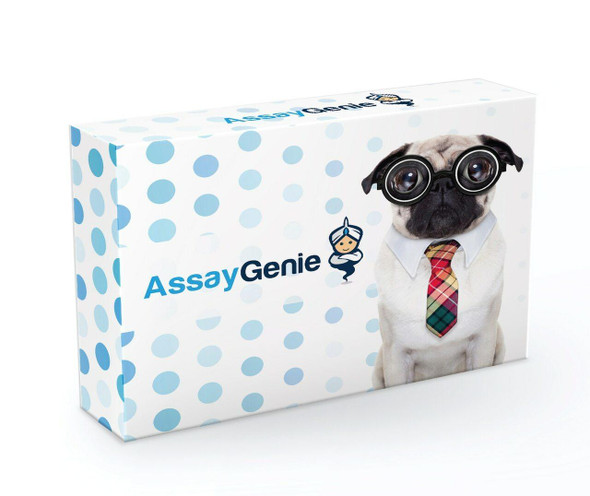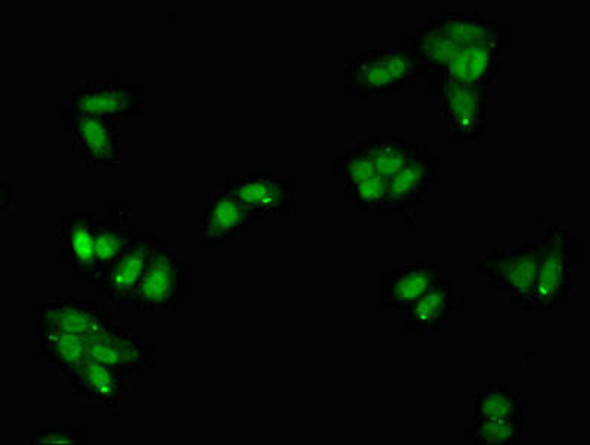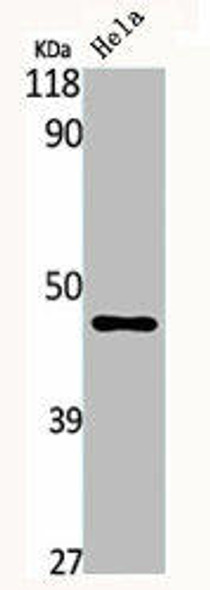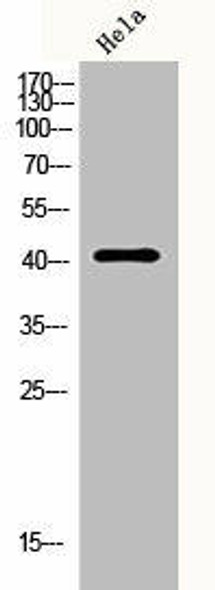Description
SERPINA5 Antibody (PACO22506)
The SERPINA5 Antibody (PAC022506) is a powerful tool for researchers studying SERPINA5, a protein involved in various physiological processes, including blood coagulation and inflammation. This polyclonal antibody, raised in rabbits, exhibits high reactivity with human samples and has been validated for use in Western blot applications. By specifically binding to the SERPINA5 protein, this antibody enables accurate detection and analysis in a variety of cell types, making it an ideal choice for studies in immunology, hemostasis, and cardiovascular research.SERPINA5, also known as Protein C Inhibitor (PCI), plays a crucial role in regulating the activity of Protein C, an important anticoagulant.
Dysregulation of SERPINA5 has been linked to various diseases, including thrombosis, sepsis, and cardiovascular disorders. Understanding the function of SERPINA5 is essential for unraveling its role in these pathological conditions and developing targeted therapeutic interventions.With its specificity and reliability, the SERPINA5 Antibody (PAC022506) offers researchers a valuable tool for advancing our understanding of SERPINA5 biology and its implications in disease mechanisms.
| Antibody Name: | SERPINA5 Antibody (PACO22506) |
| Antibody SKU: | PACO22506 |
| Size: | 100ul |
| Host Species: | Rabbit |
| Tested Applications: | ELISA, WB |
| Recommended Dilutions: | ELISA:1:2000-1:10000, WB:1:500-1:3000 |
| Species Reactivity: | Human |
| Immunogen: | Synthesized peptide derived from internal of human Serpin A5. |
| Form: | Liquid |
| Storage Buffer: | Rabbit IgG in phosphate buffered saline (without Mg2+ and Ca2+), pH 7.4, 150mM NaCl, 0.02% sodium azide and 50% glycerol. |
| Purification Method: | The antibody was affinity-purified from rabbit antiserum by affinity-chromatography using epitope-specific immunogen. |
| Clonality: | Polyclonal |
| Isotype: | IgG |
| Conjugate: | Non-conjugated |
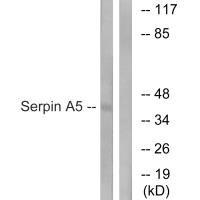 | Western blot analysis of extracts from Jurkat cells, using Serpin A5 antibody. |
| Background: | Heparin-dependent serine protease inhibitor acting in body fluids and secretions. Inactivates serine proteases by binding irreversibly to their serine activation site. Involved in the regulation of intravascular and extravascular proteolytic activities. Plays hemostatic roles in the blood plasma. Acts as a procoagulant and proinflammatory factor by inhibiting the anticoagulant activated protein C factor as well as the generation of activated protein C factor by the thrombin/thrombomodulin complex. Acts as an anticoagulant factor by inhibiting blood coagulation factors like prothrombin, factor XI, factor Xa, plasma kallikrein and fibrinolytic enzymes such as tissue- and urinary-type plasminogen activators. In seminal plasma, inactivates several serine proteases implicated in the reproductive system. Inhibits the serpin acrosin; indirectly protects component of the male genital tract from being degraded by excessive released acrosin. Inhibits tissue-and urinary-type plasminogen activator, prostate-specific antigen and kallikrein activities; has a control on the sperm motility and fertilization. Inhibits the activated protein C-catalyzed degradation of SEMG1 and SEMG2; regulates the degradation of semenogelin during the process of transfer of spermatozoa from the male reproductive tract into the female tract. In urine, inhibits urinary-type plasminogen activator and kallikrein activities. Inactivates membrane-anchored serine proteases activities such as MPRSS7 and TMPRSS11E. Inhibits urinary-type plasminogen activator-dependent tumor cell invasion and metastasis. May also play a non-inhibitory role in seminal plasma and urine as a hydrophobic hormone carrier by its binding to retinoic acid. |
| Synonyms: | acrosomal serine protease inhibitor; IPSP; PAI-3; PAI3; PCI |
| UniProt Protein Function: | SERPINA5: Heparin-dependent serine protease inhibitor acting in body fluids and secretions. Inactivates serine proteases by binding irreversibly to their serine activation site. Involved in the regulation of intravascular and extravascular proteolytic activities. Plays hemostatic roles in the blood plasma. Acts as a procoagulant and proinflammatory factor by inhibiting the anticoagulant activated protein C factor as well as the generation of activated protein C factor by the thrombin/thrombomodulin complex. Acts as an anticoagulant factor by inhibiting blood coagulation factors like prothrombin, factor XI, factor Xa, plasma kallikrein and fibrinolytic enzymes such as tissue- and urinary- type plasminogen activators. In seminal plasma, inactivates several serine proteases implicated in the reproductive system. Inhibits the serpin acrosin; indirectly protects component of the male genital tract from being degraded by excessive released acrosin. Inhibits tissue-and urinary-type plasminogen activator, prostate-specific antigen and kallikrein activities; has a control on the sperm motility and fertilization. Inhibits the activated protein C-catalyzed degradation of SEMG1 and SEMG2; regulates the degradation of semenogelin during the process of transfer of spermatozoa from the male reproductive tract into the female tract. In urine, inhibits urinary-type plasminogen activator and kallikrein activities. Inactivates membrane-anchored serine proteases activities such as MPRSS7 and TMPRSS11E. Inhibits urinary-type plasminogen activator-dependent tumor cell invasion and metastasis. May also play a non-inhibitory role in seminal plasma and urine as an hydrophobic hormone carrier by its binding to retinoic acid. Belongs to the serpin family. |
| UniProt Protein Details: | Protein type:Secreted, signal peptide; Secreted Chromosomal Location of Human Ortholog: 14q32.1 Cellular Component: acrosomal membrane; external side of plasma membrane; extracellular region; extracellular space; membrane; protein complex Molecular Function:acrosin binding; glycosaminoglycan binding; heparin binding; phosphatidylcholine binding; protease binding; protein binding; retinoic acid binding; serine-type endopeptidase inhibitor activity Biological Process: blood coagulation; negative regulation of hydrolase activity; spermatogenesis |
| NCBI Summary: | The protein encoded by this gene is a member of the serpin family of proteins, a group of proteins that inhibit serine proteases. This gene is one in a cluster of serpin genes located on the q arm of chromosome 14. This family member is a glycoprotein that can inhibit several serine proteases, including protein C and various plasminogen activators and kallikreins, and it thus plays diverse roles in hemostasis and thrombosis in multiple organs. [provided by RefSeq, Aug 2012] |
| UniProt Code: | P05154 |
| NCBI GenInfo Identifier: | 322510122 |
| NCBI Gene ID: | 5104 |
| NCBI Accession: | P05154.3 |
| UniProt Secondary Accession: | P05154,Q07616, Q9UG30, |
| UniProt Related Accession: | P05154 |
| Molecular Weight: | 45,675 Da |
| NCBI Full Name: | Plasma serine protease inhibitor |
| NCBI Synonym Full Names: | serpin family A member 5 |
| NCBI Official Symbol: | SERPINA5 |
| NCBI Official Synonym Symbols: | PCI; PAI3; PAI-3; PCI-B; PROCI; PLANH3 |
| NCBI Protein Information: | plasma serine protease inhibitor |
| UniProt Protein Name: | Plasma serine protease inhibitor |
| UniProt Synonym Protein Names: | Acrosomal serine protease inhibitor; Plasminogen activator inhibitor 3; PAI-3; PAI3; Protein C inhibitor; PCI; Serpin A5 |
| Protein Family: | Plasma serine protease inhibitor |
| UniProt Gene Name: | SERPINA5 |
| UniProt Entry Name: | IPSP_HUMAN |
| Secondary Antibody |
| Anti-HRP Goat Anti-Rabbit IgG (H+L) Antibody (CABS014) |
| Recommended Products |
| Anti-FITC Goat Anti-Rabbit IgG (H+L) Antibody (CABS011) |
| Anti-HRP-conjugated Beta Actin Antibody (CABC028) |


